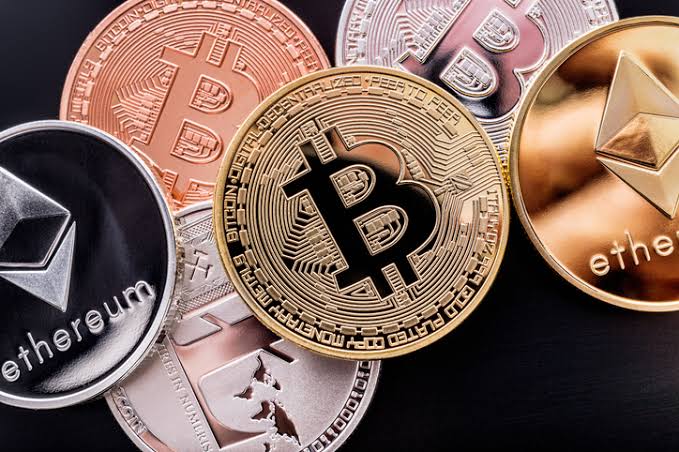Business
Crypto traders project greatest rally for Bitcoin

– Expect it to hit $200,000 in 2025 in spite of govt crackdown
As the Nigerian currency, the naira, continues to plunge against international currencies, traders are scampering for options to hedge against the embattled naira and crypto -currencies seem to have become a credible choice. Consequently, crypto traders are projecting the greatest rally in history for the virtual currency next year.
However, this comes against the backdrop of preemptive action by government to clampdown on them to battle what it sees as part of reasons for the rapid fall of the naira – which has collapsed from N700 to the dollar in May 2023, to N1900 to the dollar at the parallel market within the first nine months of the President Bola Tinubu administration. The federal government last week, began crack-down on major cryptocurrency trading platforms, such as Binance, Forextime, OctaFX, Crypto, FXTM, Coinbase and Kraken. But the action has predictably proved futile thus far in terms of halting the trade.
Many Nigerian traders observed on Tuesday that Peer to Peer (P-2-P) transactions had been restricted on Binance, the most widely used exchange in the country, which meant that they could no longer contact sellers or place sell orders on the platform. Web access to the exchanges were also blocked, such that only those with Binance app or VPN could access the platform.
The government, it was gathered, decided to move against Binance and other crypto firms following reports that currency speculators and money launderers were using them to execute criminal activities, which they reasoned are contributing significantly to the weakening of the naira.
The concern may not be unfounded, even if many would argue that the reasons advanced for the growing adoption of crypto and the possible effect on naira flies in the face of logic, and the approach to its restriction not well thought out. As at 2020, data from Paxful, a peer-to-peer bitcoin marketplace, indicated that the value of bitcoins traded in Nigeria over the previous five years was more than any country in the world, except the United States.
The data had shown that Nigeria traded 60,215 bitcoins worth more than $566 million between 2015 to 2020, a figure surpassed only by the U.S, where 535,660 bitcoins were traded between 2015 to 2020 with the value standing at $3.8 billion.
Nigeria remains Africa’s largest crypto economy, receiving the highest cryptocurrency value between 2022 and 2023, and the trend has continued to grow. A report by global research firm Morning Consult published on July 7, 2022 showed that despite the ban slammed on crypto trade by the Muhammadu Buhari administration in 2021, Nigeria was one of the six countries in which more than a third of the adult population bought or sold cryptocurrencies at least once a month.
Nigeria and Turkey – two countries, whose local currencies have continued to suffer massive depreciation – each with more than 50% monthly active adult crypto traders – topped the list of 40 countries surveyed. South Africa, Russia, and India were also in the top 10.
Besides the need to make money and ease of cross border transactions, preservation of value ranks high on the motivation for crypto adoption in countries with unstable currencies like Nigeria. Argentina, which is also facing a currency crisis that has seen the value of the peso decline by 80% against the dollar, and has been struggling with high inflation, low growth, large fiscal and current account deficits, and a heavy debt burden, has also seen growing adoption of crypto by citizens.
Alfonso Martel Seward, Head of Compliance & AML at Argentina-based cryptocurrency exchange Lemon Cash, noted recently that crypto had become mainstream in the South American country, with about 5 million people out of a total population of 45.8 million adopting it.
The 2023 Geography of Cryptocurrency Report by Chainalysis showed that Nigeria had the highest P2P exchange volume globally. The country had ranked 18th for P2P exchange volume in 2021, but went up one place to 17th in 2022, before eventually making top spot in 2023 as more Nigerians apparently opted into the crypto space as the naira continued to slide and uncertainties surrounded domiciliary accounts in the country.
Meanwhile, amid the panic and controversy that followed the government crackdown last week, Binance on Wednesday, issued a statement indicating its intention to collaborate with the Nigerian government, noting that, “users behaving in a manipulative way” will be removed from its platform.
The platform also announced that it had introduced price cap for dollar exchange, declaring that, “As industry leaders, we are working hand in hand with local authorities, lawmakers, and regulators to ensure we act on non-compliance, setting an upper limit for ads, filtering and removing bad ads, requiring and raising deposits for merchants posting ads as well as processes for actioning against any market manipulators.”
Bayo Onanuga, Special Adviser on Information and Strategy to President Tinubu, also confirmed on Wednesday that the Nigerian Communications Commission (NCC) directed telcos to block access to crypto exchanges, and they had started acting on it.
The development triggered a bit of panic, such that when Binance subsequently lifted its restriction to P-2-P, and introduced price caps, some sellers listed for as low as N1,500 on the platform, perhaps in a rush to sell off, even if many argue that the spot listing was misleading.
But whatever relief the government got was short-lived as traders soon shrugged off the threat and things gradually returned to normal.
“That impact (of government intervention) caused panic,” said Adol Omeke, a seasoned crypto trader and analyst. “You know, market reacts once there is uncertainty. Binance tried pegging when the suggestion was put across, and that was on the first day. But everybody cancelled orders, which meant they lost all the liquidity. They later removed it and everything continued as normal, before Bayo Onanuga came up with that write up, which set the market into a frenzy.
“It made people, who didn’t understand the market to place sell orders for as low as N1,500. But people, who understood the system and knew it was just a temporary setback, left the market. So, after the frenzy, market began to stabilise again. Now, everything is almost back to normal.”
Many had taken to social media to criticise the Tinubu government over the move, arguing that attempting to regulate or crack down on crypto transactions on P-2-P was a waste of time because, according to them, even if Binance opted to restrict or cap transactions, buyers and sellers could simply move to alternative channels like Telegram and WhatsApp. This is even as instructing telcos to block access achieved little as users simply migrated to VPN to bypass the restriction”.
The comments, particularly one made by Mikael Bernard, @MikaelCBernard, however, did not sit well with Onanuga, who accused him of being one of the dollar manipulators.
Bernard had disclosed on Wednesday that Binance capped the maximum amount a seller could sell naira at N1,892 to the dollar, which according to him, meant that, “even if the USD rises to 2000/$ on other platforms, you can’t sell above 1892/$ on Binance.”
He further argued that Binance forget that even the CBN eliminated exchange rate caps on IMTOs, of which Binance should rightfully fall under, while warning the platform that move will crumble it.
Railing against Bernard via his X account, @aonanuga1956, Onanuga accused him of being “one of those implacable supporters of President Bola Ahmed Tinubu’s opponents in the last election, still having an axe to grind.”
The presidential spokesman wrote: “I chanced on an X post Tuesday night by one Brother Bernard @Mikael C Bernard, who railed against what he called the order of the EFCC, NSA on Finance to set a cap on traders selling USD tokens for Naira equivalent.
“He disclosed that token sellers have migrated to Telegram and were selling Naira at N1850 and above.
“He did not stop there, he lashed out at the Nigerian authorities over the efforts to arrest the slide of the Naira. He wrote: “If this is how they plan to save the naira, I’m sorry but it’s going to fail woefully. Binance was only a medium. If you block Binance, people will find new ways.This whole policy is absolutely ridiculous. Naira is going to zero”.
“Naira going to Zero? Is the owner of this account a Nigerian patriot? I checked Bernard’s profile. He says he is “BUILDING something for migrants” and he is the “Chief Commander of Japa”. Bernard also posted a web link www. http://exposingagbado.com.
“My curiosity has paid off. Bernard is one of those implacable supporters of President Bola Ahmed Tinubu’s opponents in the last election, still having an axe to grind; otherwise, why will any patriotic Nigerian wish that “Naira is going to Zero”.
“On Tuesday, Bernard shared Naira-Dollar rates on some unidentified platforms, possibly Telegram, where Naira is being traded at N1900-N1950 to a U.S dollar.
“He also enjoined forex traders or token holders to move their funds to “kucoin or bybit or your own cold wallet”.
“Today, Bernard reported again that Binance has removed Tuesday’s cap and has now put another cap on Naira-dollar exchange. It is now N1892, he said, with a trading range of N1392 and N1892.
“He was not happy about the new cap and attacked Binance: “Binance continues their games with Nigerians. Caps at 1892 when clearly the exchange rate is almost 2000/$ on other platforms. Trade elsewhere (NFA)”.
“He retweeted a post by ‘Olumide capital’, who said Binance “distances itself from the forex debacle in Nigeria. Olumide reported that Binance said its platform is “market-driven and not intended to be a proxy for currency pricing in Nigeria.”
“Binance, which is blatantly setting exchange rate for Nigeria, hijacking CBN role, is a cryptocurrency trading platform, and suffers access limitations from multiple jurisdictions, such as the U.S, Singapore, Canada and the UK.”
Suggesting that Nigeria may consider banning Binance altogether, Onanuga, noted that, “According to Data Wallet, Binance is prohibited in the United Kingdom by the Financial Conduct Authority from conducting any regulated activities. In Japan, the Financial Services Agency (FSA) banned Binance for operating without the necessary regulatory approval.
“Ontario, Canada, has also suspended Binance services following its inability to meet the province’s securities regulation criteria. The Monetary Authority of Singapore also banned Singaporean investors from accessing Binance’s services.
“Binance, facing regulatory showdown in many countries, and causing disruptions in the currency market, should not be allowed to dictate the value of the Naira, not on its crypto exchange platform. Other crypto platforms, such as Kucoin, Bybit should be banned from operating in our cyberspace. FX platform Aboki should be re-banned.
“The EFCC and the CBN should move against these platforms trying to manipulate our national currency to Ground Zero. Crypto should be banned in our country or else this bleeding of our currency will continue unabated.”
But Bernard hit back at Onanuga, in what turned into a social media banter, advising him to go to Binance and sell dollar at N1,000 in order to crash the rate since it’s a free market.
“Bayo Onanuga claims that Binance P2P traders and Brother Bernard are the ones crashing the Naira,” he wrote. “Just so you know. It’s a free market. Let CBN go on Binance P2P and sell their own dollars for 1000 NGN/$. Total volume in Binance is barely $30m. Let CBN bring out $100m, give APC crypto traders and send them to go and crash prices in Binance.
“If he claims it’s my tweets that’s crashing Naira, let him pay Agbado influencers with bigger handles to tweet that Naira will rise.
“After two months, we’d check report card and know, who is the enemy of the Nigerian people, and who is their friend. Economics is not sentimental. Show workings.”
Bitcoin price at $200,000
The Tinubu government, which had in December 2023, lifted the ban on crypto transactions imposed by its predecessor, Muhammadu Buhari, may yet resort to banning the trade. But if there’s any lessons learned from the Buhari era ban, it is that such bans is a waste of time and effort, and many crypto traders say they are not sparing a thought on it, but are instead looking forward to another bull run in 2025.
“They lifted the ban by themselves because they also discovered that crypto currency trading is not illegal,” said a trader, Ope Folorunsho.
“The interest they are trying to protect is to halt the exchange of naira to the dollar, which they believe is adding more pressure to the naira. That’s why they are seeing Binance and other major trading platforms, as a threat. They went after them to block their activities. But why that is not going to be possible is that we’re in 2024 for goodness sake. The only thing they can do is to limit those with insufficient knowledge about how to manoeuvre the system.”
Ope noted that with the next Bitcoin halving occuring in April, the value of Bitcoin, which drives other cryptocurrencies, is expected to rise to more than times three of its last 2021 $68,000 peak in 2025.
“What I’m currently looking at is how to accumulate funds to buy crypto ahead of the next bull run,” he said. “I expect that going by the trend, Bitcoin will reach $200,000 next year after halving in this year.”
Bitcoin, which was invented in 2008 by Satoshi Nakamoto, an unknown person, with its use as a currency beginning in 2009, follows a four year cycle of halving.
This means that after every four years, from the protocol that governs the Blockchain technology on which it runs, the incentive given to miners will drop by half. That is to say that for every block mined, the miners will be compensated with certain amount of Bitcoin. The reward for mining a block from the genesis block was 50 Bitcoins. Then in the first cycle, which happened in 2012, it reduced to 25. In the halving of 2016, it dropped again by half, to 12.5. Then in the halving of 2020, it came down to about 6.25.
“It is only through mining of blocks that a new Bitcoin can be released into the market. So, halving means that the rate with which new coins are coming into the market has reduced by half, therefore creating scarcity,” explained Omeje.
“At the same time, more people are joining the crypto trade. Which means that you have more people but less Bitcoins, and in economics, once there is less supply but increased demand, prices will shoot up.
“The next halving is going to take place around April 22, 2024, and the expectation is that the reward for mining will reduce by half. This means that price of Bitcoin has to go up to compensate for the effort and financial commitment it took to mine since the miners will have less quantity of Bitcoin, while maintaining the same mining cost. It costs a lot to mine. It’s the combination of some of these factors that push the price up.”
Omeke also agrees…
“It cycles out the year after mining, that’s why we’re projecting that by 2025, the price of Bitcoin may go up to as much as $200,000 going by the trend. In 2017, which is a year after the 2016 halving, it went from $1,000 to about $20,000. Then in 2021, that’s a year after the 2020 halving, it went about $68, 000,” he said.
“That was more than times three of the 2017 figure. So, if it’s going to replicate something like that, we can say that it will be heading towards $200,000 in 2025, or at least $180,000. It can also be way higher because of growing endorsement of Bitcoin. We have seen huge adoption of Bitcoin in recent times and the approval for Bitcoin ETF has brought it to the mainstream. So, it is possible that the next bull run can surpass $200,000.”













